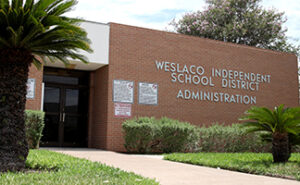
The Weslaco school district’s much-discussed forensic audit reveals a number of irregularities and inefficiencies in district operations, including potential nepotism violations regarding the then-human resources director, a friendly relationship between the district’s transportation director and bus repair vendor.
Released Monday evening, the 129 pages of audit reporting covering a five-year span submitted by Weaver and Tidwell LLP prompted lengthy discussion by the school board Monday, with trustees and district leadership vowing to implement changes to improve district operations.
The board will consider some of those changes Tuesday, when they’ll discuss corrective plans for its business and operations and its human resources departments in response to the audit.
The audit’s launch earlier this year preceded several high level personnel changes, including the resignations of Superintendent Priscilla Canales and Director of Athletics & District Facilities Oscar Riojas, along with the reassignment of Human Resources Director Melva Segura.
HIRING
Hiring practices account for a large portion of the audit, which describes selections being made based on board or administrative preference rather than candidate qualifications.
Auditors wrote that they found a pattern of “micromanagement” by the district’s board influencing hiring practices going back to 2014, along with actions by Segura that sometimes favored lesser qualified candidates.
“Once Melva Segura (“Ms. Segura”) was hired as HR Administrator in November 2014 and then promoted to HR Director in September 2015, Ms. Segura acted as a gatekeeper for the Board, influencing the recommendations from the Interviewing Committees before the candidates went to the Board for approval,” it reads. “ As a result, certain hiring decisions during the period of our review appear to have been influenced by the preference of the Board, or in some instances Ms. Segura, rather than the qualifications of the candidate.”

Segura’s name almost constantly reoccurs in the first of Weaver’s two audit reports, appearing a total of 177 times in that report.
That document describes a meteoric career shift for Segura that began in 2014, when she was approved by the board as HR administrator after it declined to approve a more qualified candidate recommended by an interviewing committee and the superintendent earlier that year.
Segura, who was a data analyst in the district’s migrant department before joining HR, was selected for her new role over candidates who had more experience and more education.
An active volunteer in local politics, Segura volunteered on the campaign of at least one trustee serving on the board when it approved her switch to HR.
Within a year, Segura was promoted from administrator to director of human resources over a dozen other candidates holding masters degrees. Segura did not hold a masters degree, despite that being a requirement for the post.
Segura emailed herself interview questions for that post the night before her interview, the audit says, questions that did not appear to have been made available to other candidates prior to their interviews.
The switch from data analyst to HR director resulted in a 107% increase in compensation — from $48,819 to $101,278.
In her new role, Segura submitted personnel recommendations to the superintendent requesting the district hire her family members, “potentially in violation of the District’s nepotism policy,” the report stated.
Those family members included her son and daughter.
Although Segura’s son’s benchmark scores as a new sixth grade math teacher at Mary Home Middle School in 2015 were adequate, the school began to receive complaints about him falling asleep in the classroom and staff meetings on several occasions.
The district granted Segura’s son a “workplace accommodation” in early 2020 allowing him to use a CPAP machine during his lunch hour.
Over the next few years the audit describes two instances where recommendations for candidates submitted to Segura by interviewing committees failed to make it in before the board, although during an interview with auditors Segura indicated that if a candidate recommended by the committees was not recommended to the board it would have been at the direction of the superintendent.
“In addition to the two instances described above, we received information from several current and former District employees who indicated that they received phone calls from Ms. Segura while serving on an Interviewing Committee in which Ms. Segura directed them to recommend a candidate that was favored by the Board,” it read. “One individual indicated that Ms. Segura informed them of the candidate the Board wanted to be recommended and instructed them to ‘make it happen.’”
The board discussed a grievance filed against the district by Segura at a meeting in August, a board agenda shows.
The report also describes several instances in which candidates recommended by interviewing committees and the superintendent were not approved by the board, and even an instance in 2015 where a person who did not apply for a position at Weslaco East High School was hired for that position after an interim principal added his name to a list of applicants.
A variety of other situations related to job descriptions and pay grade reclassifications are described by the report as well.
The majority of the positions reviewed by auditors have job descriptions that haven’t been updated since 2014.
In some instances, reclassification of positions between pay grades resulted in substantial increases in pay, despite auditors not identifying “any supporting documentation for reclassification of these positions.”
BUS REPAIRS
Much of the auditors’ second report focuses on the relationship between Transportation Director Lupe Garcia and Mid Valley Trailer Repair, which became the favored vendor for bus repairs during Garcia’s tenure.

Mid Valley Trailer Repair has not responded to a request for comment.
Although the district had used the business for work prior to Garcia assuming his post in 2016, those payments skyrocketed after he took over.
The audit found Mid Valley Trailer Repair was paid $686,123 for maintenance and repair of district buses in fiscal years 2015-2020, more than half of the district’s total payment to vendors for that cost category in that period.
Garcia’s nephew married Estevanes’ niece in 2015. The audit described Garcia and the owner of Mid Valley Trailer Repair, Richard Estevanes, as being well-acquainted.
“We were also informed that it was common for Mr. Estevanes to make visits to the Transportation Department, as well as go to lunch with Mr. Garcia,” the report read.
One employee, who was not named in the report, says they were offered Dallas Cowboys tickets by Estevanes in exchange for sending future repair business Mid Valley Trailer Repair’s way. That employee told auditors he did not accept the tickets.
The report also says quotes from other vendors on bus repairs were frequently not obtained and that Garcia advocated combatively for the business to be awarded a vendor contract for automotive and bus parts.
Garcia justified sending so much business to Mid Valley Trailer Repair because of competitive rates and its location across the street from the district’s bus depot, which he said decreased turnaround times. He also said the business lent programming and specialty tools to the district at no charge to assist in bus repairs.
The auditors paid particular attention to repairs to the district’s older bus fleet, which had been damaged during flooding in 2018 and were used as spares.
Maintenance and repairs on those 21 buses accounted for the bulk of repairs and maintenance performed by Mid Valley Trailer Repair, $179,000.
Although some of those buses were being utilized, others had clocked exceptionally low mileage since the floods despite repair costs ranging into the tens of thousands.
In one case a bus that had only racked up 72 miles since 2018 was repaired for a total of $16,916.29 — an average of $236.26 in repair costs per mile.
PURCHASES
Based on its findings regarding payments to vendors and contractors, the audit recommends the district review expenses to ensure they’re in line with district objectives and enhance processes regarding purchases.
A little under a quarter of payments to vendors from 2015 to 2020 — $58.5 million — lacked purchase orders, the report says, although most of those payments were board-approved and they don’t appear to have been circumvented.
Some instances, mostly after flooding in 2018, were approved as emergency purchases without purchase orders, although the report said it was unclear why payments to some vendors like South Point EMS and special education consulting vendors lacked purchase orders.
“Approximately 90% of the District’s payments to South Point EMS did not have a purchase order,” the report stated.
The report in particular recommends the district examine its spending on awards and incentives.
From 2015 to 2020 the district spent $4.9 million in that category, mostly for T-shirts and apparel for students and staff.
The district’s budget for those years was consistently lower, only totaling $3.3 million.
“However, the District’s actual expenditures for awards and incentives were typically 40% – 60% higher than the annual budgeted amounts,” the report read.
The district spent $627,629 on awards and incentives in which a required number of quotes was not obtained, the auditors found, about half of which was spent on holiday purchases in December.
“Based on our review, the holiday incentive funds were typically allocated to the campus budgets in November and there was insufficient time for the campuses to obtain multiple quotes before the holidays,” the audit read.
DISTRICT STRUCTURE
The audit report describes portions of the big picture setup of the district’s administration to be poorly aligned in some cases
“We determined that the District’s organizational structure lacks functional alignment and exhibits inconsistencies across job assignments that are not necessarily aligned to the strategic needs of the District,” the report stated. “In some cases it appeared that the District modified the organizational structure to fit certain individuals rather than the organization as a whole.”
At Weslaco ISD, eight individuals report directly to the superintendent, above average compared to other districts of its size.
The employee benefits and risk management is separate from human resources, despite an overlap in functionality, while the executive director of athletics and district facilities position combines two broad scopes of responsibility that lack much connection.
Those roles were not combined in the majority of other similar districts the audit examined.
The roles of other administrative posts are poorly defined, it says.
“Individuals in school district leadership roles should be selected and assigned to most effectively and efficiently meet the needs of the district,” the audit read. “A district should not accommodate an individual in a leadership capacity who cannot meet all the requirements of his or her assignment by transferring functions to another column, nor should a district accommodate an individual with specific abilities or interests outside of the individual’s responsibilities by transferring those functions into that individual’s scope of work.”
The audit notes that those critiques are not an indictment of any person’s abilities at the district and that individual districts are unique, but posits that Weslaco would benefit from rejiggering its current leadership alignment.
RELATED READING:
After months of anticipation, Weslaco school board to discuss forensic audit



